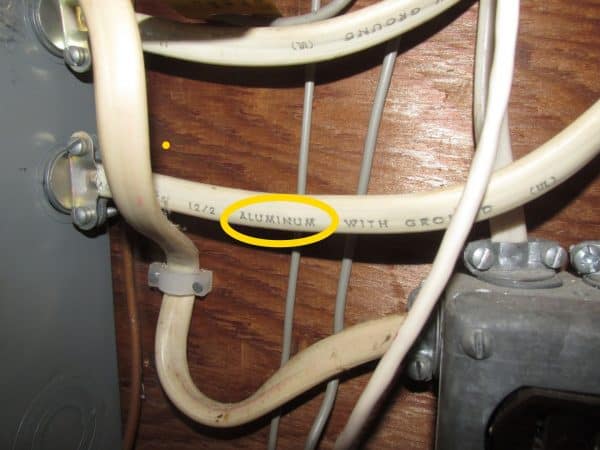Do you have aluminum wiring in your home?
If your home was built during the 1960’s and 1970’s chances are that your home has aluminum wiring. Although copper has always been preferred over aluminum wiring, during the 1960’s and 1970’s the price for copper skyrocket driving the market to look for new alternatives. This led aluminum wiring to make an appearance. However, this new type of wiring was short lived as fears of fires cause by the overheating of the connections drove homeowners to opt for copper instead.
If you are unsure about when your home was built you can check for aluminum wiring by carefully and safely taking a look at any exposed wires, such as those found in your basement, or by taking a look at your electrical panel. If the wiring was manufactured during the 1960’s and 1970’s the outer covering of the cables will be marked with ALUMINUM, or some sort of abbreviation such as ALUM or AL.
Why should I be concerned about Aluminum Wiring?
- Aluminum can be damaged easily: Aluminum wiring has a higher chance for potential fire hazard due to the fact that aluminum is a softer metal than copper and is much more prone to damage during installation.
- Aluminum expands when heated: When the aluminum wire expands and contracts it can lead the wires to move from its place, causing the screws that keep it in place to fall off and thus leading to overheating and potential fire.
- Aluminum oxide increases electrical resistance: An important difference between aluminum and copper is the impact of oxidation on their electric conductivity. When copper is exposed to oxidization the layer that forms on copper, called copper oxide, still conducts electricity easily, meanwhile aluminum oxide is less conductive and over time oxidation can damage the wiring connections and increased the chances for a fire hazard.
- You will have a difficult time finding house insurance: If you are thinking of selling your home you must be advised that according to the Electrical Safety Authority insurers are denying or not renewing insurance coverage to homes built between 1960 and late 1970, unless these homes are inspected by a licensed electrician and have their wiring replaced or repaired. Once the necessary work has been done and inspected by an ESA inspector, a copy of the certificate of inspection will be issued to the insurer and you may obtain house insurance.
What are some of the warning signs that your aluminum wiring needs inspection?
- Cover plates that feel warm to the touch
- Deformed and misshaped outlet covers
- Receptacles and switches that smell like smoke
- Sparks coming from receptacles or switches
- Lights flickering
If you experience any of the above signs in your home needs to be inspected for aluminum wiring issues. We recommend that you do not try to examine or touch any wires but instead contact MADE Electric and one of our licenced electricians will be happy to inspect your home.
So, is aluminum wiring safe?
The short answer is yes, but only if the installations have the proper and necessary safety measures to avoid any fire hazards. Most of the reported fire problems have been due to the overheating and failure of the aluminum wiring terminations. In Ontario, the Ontario Electrical Safety Code permits the installation of aluminum wiring, as long as the connections and terminations of the wires are made without damaging the wire and using devices approved for use with aluminum.
If your home has aluminum wiring our licensed electricians may suggest that you:
1.Replace your receptacles, devices and switches with CO/ARL receptacles, switches, and devices.
2.Rewire the connections and terminations with copper wire. This means stripping the aluminum wire and twisting (Pigtailing) it together with the copper.
3. Using Copalum crimps connectors. This means adding a copper tail to the aluminum connection, while using a crimp connector. Once finished an insulating sleeve goes around it to seal the connection. This is a permanent connection and solution to any aluminum wiring issues.
If you believe your home has aluminum wiring please do not try to inspect it yourself, as you may encounter potential electrical hazards. Instead have your home inspected by one of our MADE Electric licensed electricians. Our electrical services are available in Toronto and the Greater Toronto Area 24/7, please contact us at 1-833-MADE-247 or info@madeelectric.ca.

